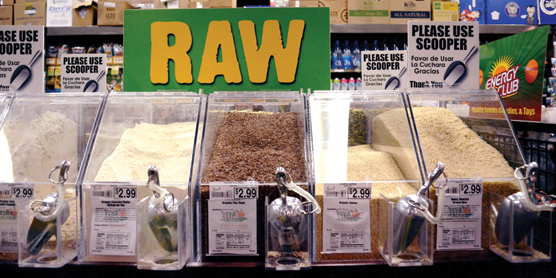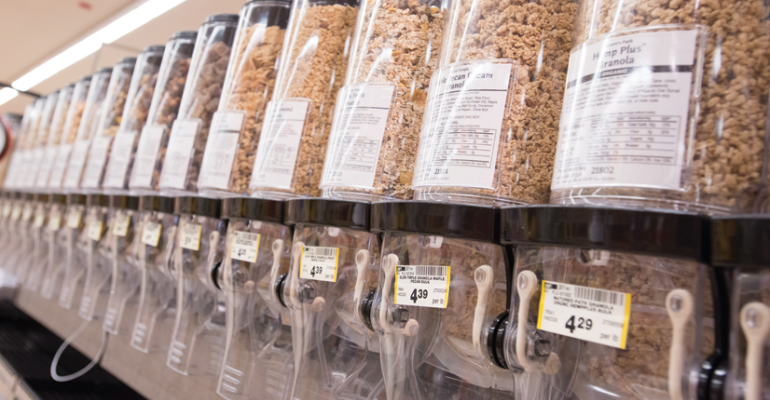Northgate Gonzalez Market, Anaheim, Calif, is fairly new to the bulk food category, but already has plans to expand.
The retailer, which caters to Hispanic customers, currently carries about 80 bulk items, including nuts, dried fruits and granola, and plans to go up to 200 products by the end of 2013 due to the success of the section.
Northgate started offering bulk foods in select locations about two years ago, bringing the category to all stores this year as part of an expansion of its Viva La Salud wellness program.
“The way we see this, we really see a trend in the second and third generation to a healthier choice, healthier stuff for their kids and themselves, too,” said Ali Moezzi, director of produce, whose department oversees bulk foods.
He said customers are learning to replace potato chips with healthier snacks like nuts by buying from the bulk section.
Northgate isn’t the only one seeing success in bulk foods. Long the domain of natural food stores, traditional retailers have been trying out the category to attract consumers who are interested in the environmental message that it provides, as well as the convenience and variety.

“The success of bulk foods in the natural organic store has been able to prove to the conventional retailer, the mainstream retailer or even the mass retailer, that it does have a place within their store and that there are consumers who are mainstream consumers, not just the ‘crunchy munchy’ natural organic shopper, but a mainstream shopper who is looking for this type of convenience, to be able to purchase as little or as much as they want,” said Todd Kluger, a board member for the Bulk is Green Council, an industry promotional group.
Other customers may buy bulk for environmental reasons, because it cuts down on packaging, or because they want to try new foods that aren’t yet available as packaged products, added Kluger, who is also vice president of marketing at Lundberg Family Farms.
Some consumers have voiced their desire for bulk foods directly to retailers. Before Brookshire Grocery Co. remodeled a Brookshire’s location in Shreveport, La., the retailer surveyed customers to find out what they would like to see in the Line Avenue store.
“A bulk food section was requested by our Line Avenue shoppers. Our goal is to be the finest shopping destination in our market area, and adding a bulk food section allows us to provide additional products that aren’t offered elsewhere,” said Jerry Jarrard, vice president and district manager.
Prior to that, Brookshire only carried bulk foods in its FRESH by Brookshire’s concept store in Tyler, Texas.
The Line Avenue store offers 132 bulk items from nuts and trail mix to dried beans and rices.
“Our bulk food section is located in a high-traffic location of the store where all customers have easy access. The products are displayed in gravity-fed bins, which ensures products are rotated as customers dispense their selections into bags,” said Jarrard.
Maintaining fresh product is an important aspect of bulk foods at Brookshire’s.
“We follow a strict, detailed rotation process that outlines specifically how these products are received, stored, rotated and stocked. All products are tracked to ensure their freshness and quality,” said Jarrard.
“The store follows a detailed cleaning process of the display bins, and all bulk food bins are detail cleaned once every nine weeks. Our store leaders inspect and document each step of these processes for verification, which ensures our customers have 100% confidence in Brookshire’s commitment to freshness.”
Bins Change With the Times
It may seem like a simple concept — loose product dispensed from bins — but bulk foods have benefited from advances in bin design in recent years.
“The bins have definitely changed over the years. We’re not talking about bins that are just old pickle barrels, the way they used to be maybe 50 years ago,” said Kluger.
Today’s bins can be easily swapped out for cleaning or replacing with new items, and the scoops are often attached to the bin so they don’t fall on the floor.
“And the perception the consumers used to have of bulk items sitting there collecting dust, or people just sticking their hands in and eating them, eating the items, those myths have definitely been disappearing as more and more consumers actually shop the bulk section and see that it is clean, and it is a safe place to shop,” said Kluger.
Moezzi said Northgate uses small bins with a limited amount of product that empties fairly quickly. “That usually sells within a week and we don’t really have to keep it for too long. So it really stays fresh,” he said.
Bulk foods have been a part of WinCo Foods, Boise, Idaho, for 20 years, but even that retailer is noticing that “bulk is kind of hot these days,” said company spokesperson Michael Read.
WinCo sells over 700 bulk items, including candies, flours, nuts, pastas, snack mixes, 48 kinds of coffee beans and even pet food. There is also liquid bulk such as honey, agave, oils and vinegars.
Bulk is its own department within the store and typically occupies 3,000 square feet of the average 90,000-square-foot store. WinCo offers bulk in all 87 of its stores.
“And in terms of pricing, obviously it’s lower, but we tend to price directly off of our grocery products and maintain a certain spread between grocery and bulk,” said Read.
“And we do that based upon a computer program and we also watch our competition to see if we need to make any price adjustment. Because we do tout ourselves as the supermarket low-price leader and we try to make good on that promise.”
For its bulk food pricing, Northgate decided to take a different approach than some other retailers.
“What we did that really worked for us is we really simplified the program. So we just created a group of items we sell at the same retail price. So people can mix and match,” said Moezzi.
“Because most places, everywhere you go, they sell them based on individual item. So you have to write the code and all that. And it’s a headache for the customer, and different pricing, mixed pricing — it’s really confusing.”
Groups of about 15 items will have the same price so that customers can put all those products in the same container, he said.
In general, customers like bulk foods because they cost less than the packaged version, retailers agreed.
For stores, the lower cost of switching bulk products, compared to packaged items, allows for more flexibility.
“So the retailer can be a bit more experimental on putting different items in, whether it’s different types of coffees, different types of cereal blends, different candies and different grains,” said Bulk is Green’s Kluger.
That experimentation also appeals to consumers.
“Another thing we’ve found in research we’ve done recently, is that … some of the consumers shopping in the bulk section view it as a treasure hunt because they know that’s where they’re going to find some newer item that has not made it into a packaged product yet,” said Kluger.
Sidebar: On the Trail
To give customers a convenient and customizable snack on the go, Sobeys has added Trail Mix Carts to most of its stores in Ontario. The roughly 8 feet by 4 feet carts contain 22 items — like maple nut granola cereal, dried apricots and multi-colored chocolate buttons — displayed like a salad bar.
Customers can mix and match any of the items in one paper bag to create their own concoctions, which are priced at $1.49 per 100 grams. The carts are located in the store’s fresh departments.
Sobeys’s customers have reacted positively to the concept on the retailer’s Facebook page. “I’ve tried it and it’s awesome!!! What a great idea,” commented one fan.
Sidebar: The Right in.gredients
Forget about a bulk food section — in.gredients is an entire bulk foods store that opened in Austin, Texas, in August 2012.
In addition to the usual bulk items like flours, grains, rice and spices, in.gredients sells liquid bulk of cleaners and lotions. There’s beer, wine, kombucha and cold-pressed coffee on tap, as well as a soda fountain.
And the 1,500-square-foot store offers prepared sandwiches, breads and pastries, produce, frozen meat and dairy, some of which is packaged.
“Our employees have to wear many hats. They have to know how to stock, they have to know how to prepare foods, tap kegs of beer. It’s not like we have a produce department or a dry bulk department or a liquid department, or any number of things. So people have to very much be cross-trained across the board,” said Christian Lane, co-owner.
Most products are local or organic. Customers can use in.gredient’s containers or bring their own, which are weighed and labeled for easy reuse and scanning at checkout.
Lane said the concept has been a hit, and though he’s cautious, he hopes to expand soon.
“So if things go well in the next six months to two years, we would like to scale it out. I think like any grocery or any food-related business, the real money and the real viability is when you get to scale,” said Lane.
| Suggested Categories | More from Supermarketnews |
 |
|

|
|

